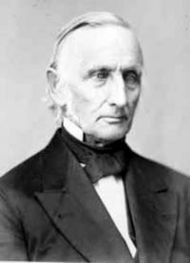Samuel Simon Schmucker facts for kids
Quick facts for kids Samuel Simon Schmucker |
|
 |
|
| Born | February 28, 1799 in Hagerstown, Maryland |
|---|---|
| Died | July 26, 1873 (aged 74) in Gettysburg, Pennsylvania |
| Church | Lutheran:
|
| Education | Princeton Theological Seminary University of Pennsylvania |
| Writings | Definite Synodical Platform |
| Offices held | President, Gettysburg Seminary Founder, Gettysburg College |
| Title | Ordained pastor |
| Children |
|
Samuel Simon Schmucker (born February 28, 1799 – died July 26, 1873) was an important German-American Lutheran pastor and thinker. He helped create the General Synod, which was a major Lutheran church group. He also founded two important schools: Gettysburg Seminary and Gettysburg College. These are the oldest Lutheran seminary and college in North America that are still running today.
Later in his life, some of Schmucker's ideas caused disagreements. This was especially true for his views on Lutheran beliefs. Outside of his church work, Schmucker was a strong supporter of ending slavery, known as an abolitionist.
Contents
Early Life and Education
Samuel Simon Schmucker was born in 1799 in Hagerstown, Maryland. His father, Johann Georg Schmucker, was a German immigrant. He was also a pastor in the Pennsylvania Ministerium. Samuel was very smart from a young age. He started attending the University of Pennsylvania when he was just 15 years old.
After college, Schmucker taught for a short time at the York Academy. Then, he went on a missionary trip. He traveled to the western parts of Kentucky and Ohio. When he returned, he studied at Princeton Theological Seminary. In 1820, he became an ordained Lutheran minister.
Founding the General Synod
In 1820, Samuel Schmucker helped create the General Synod. This was one of the first big organizations for the Lutheran Church in America. It brought many Lutheran churches together.
Leading Gettysburg Seminary
From 1826 to 1864, Schmucker was a professor at Gettysburg Seminary. He was also the head of the faculty there. He was one of the people who helped start this seminary. A building on the campus, Schmucker Hall, is named after him.
Schmucker's Home During the Civil War
During the Battle of Gettysburg in the American Civil War, Schmucker's house was used as a field hospital. Soldiers from both sides of the war were treated there. He was never paid back for the damage his home suffered.
Advocacy and Family Life
Schmucker had strong beliefs against war. In 1846, he was one of the few Lutheran leaders in America to speak out against the war with Mexico. He believed in peace.
He also played a role in forming the Evangelical Alliance. This group was created in London in 1846. Its American branch started in 1867. Schmucker was a well-known leader of the "low-church" Lutheran group. This group was part of the General Synod.
Schmucker had several children. His son, Samuel Mosheim Schmucker, became a writer of popular biographies. Another son, Beale Melanchthon Schmucker, was also a respected Lutheran clergyman. His son, Samuel D. Schmucker, joined the militia before the Battle of Gettysburg. He was involved in a small fight west of Gettysburg in 1863. Samuel Simon Schmucker is buried in Evergreen Cemetery in Gettysburg.
Schmucker also believed in theistic evolution. This idea suggests that God used the process of evolution to create life.
Why Some People Disagreed with Schmucker
Samuel Simon Schmucker became a debated figure in his later years. Some Lutherans, called Confessional Lutherans, saw his ideas as a danger to American Lutheranism. They worried he was trying to change Lutheran beliefs too much.
Views on Lutheran Beliefs
Critics thought Schmucker was trying to combine Lutheranism with other Protestant faiths. He wanted to change the Augsburg Confession. This is a very important document that explains Lutheran beliefs. Schmucker wanted a new version that would fit better with other Protestant ideas. He published this new confession without putting his name on it. However, even his own church group did not accept it.
One major point of disagreement was Schmucker's view on the Lord's Supper. He did not believe in the Real Presence of Christ in the bread and wine. Instead, he wrote that people "spiritually feed on the body and blood of the Redeemer." This idea is closer to what some other Protestant groups, like Calvinists, believe. Lutherans, however, teach about Sacramental Union.
Strong Criticisms
Because of these differences, some people strongly criticized Schmucker. For example, Charles Porterfield Krauth said Schmucker was not truly Lutheran. Wilhelm Sihler of the Missouri Synod called Schmucker an "apostate." He claimed Schmucker and others in the General Synod were "traitors and destroyers of the Lutheran Church."
The Schaff-Herzog Encyclopedia of Religious Knowledge described Schmucker's beliefs as a mix of "Puritanism, Pietism, and shallow Rationalism." They did not see his views as truly Lutheran.
 | John T. Biggers |
 | Thomas Blackshear |
 | Mark Bradford |
 | Beverly Buchanan |

